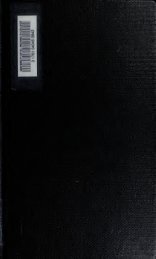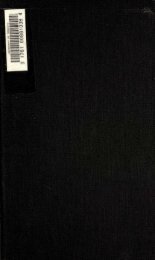Texts from the Buddhist canon : commonly known as Dhammapada
Texts from the Buddhist canon : commonly known as Dhammapada
Texts from the Buddhist canon : commonly known as Dhammapada
Create successful ePaper yourself
Turn your PDF publications into a flip-book with our unique Google optimized e-Paper software.
64<br />
DHAMMAPADA.<br />
The mind is <strong>the</strong> origin of all that is ;<br />
it is <strong>the</strong> mind<br />
that commands, it is <strong>the</strong> mind that contrives. If in<br />
<strong>the</strong> mind <strong>the</strong>re are good thoughts, <strong>the</strong>n <strong>the</strong> words<br />
are good and <strong>the</strong> deeds good, and <strong>the</strong> happiness<br />
which results <strong>from</strong> such conduct follows that man,<br />
<strong>as</strong> <strong>the</strong> shadow accompanies <strong>the</strong> substance."<br />
On hearing <strong>the</strong>se words, <strong>the</strong> king and his ministers,<br />
with countless o<strong>the</strong>rs, were converted, and became dis-<br />
ciples.<br />
2. In days of old, at <strong>the</strong> back of <strong>the</strong> Gridhraldita moun-<br />
tains, near E^jagriha, th^re w<strong>as</strong> a village, of some seventy<br />
or so families, all of <strong>the</strong>m Brahmans. Buddha wishing to<br />
convert <strong>the</strong>se people, came to <strong>the</strong> place and sat down under<br />
a tree. The people seeing <strong>the</strong> dignity of his presence, and<br />
'Ihe glorious appearance of his body, flocked round' him, on<br />
which he <strong>as</strong>ked <strong>the</strong> Brahmans how long <strong>the</strong>y had dwelt in<br />
<strong>the</strong> mountain <strong>the</strong>re, and what <strong>the</strong>ir occupation w<strong>as</strong>. To<br />
this <strong>the</strong>y replied— "We have dwelt here duriag thirty<br />
— :<br />
generations p<strong>as</strong>t, and our occupation is to tend cattle."<br />
On <strong>as</strong>king fur<strong>the</strong>r <strong>as</strong> to <strong>the</strong>ir religious belief, <strong>the</strong>y said<br />
" We pay homage and sacrifice to <strong>the</strong> sun and moon, <strong>the</strong><br />
-rain (water), and fire, according to <strong>the</strong> several se<strong>as</strong>ons. If<br />
one of us dies, we <strong>as</strong>semble and pray that he may be born<br />
in <strong>the</strong> heaven of Brahma, and so escape fur<strong>the</strong>r trans-<br />
migrations." Buddha replied to this— " This is not a safe<br />
way, nor by it can you escape <strong>from</strong> <strong>the</strong> three evil ways of<br />
fur<strong>the</strong>r existence. The true way is to follow me, become<br />
true <strong>as</strong>cetics, and practise complete self-composuxe with a<br />
view to obtain Mvlna ;<br />
" and <strong>the</strong>n he added <strong>the</strong>se lines<br />
"They who consider truth <strong>as</strong> that which is un-<br />
true,^ and regard that which is untrue <strong>as</strong> truth,<br />
1 This oorresponds with V. iiof <strong>the</strong> P&li "saro"ia in agreement (but it<br />
Pali. The Chinese " chin " is always may also correspond with " essentia."<br />
used for "Truth," and, <strong>the</strong>refore, <strong>the</strong> F.)





